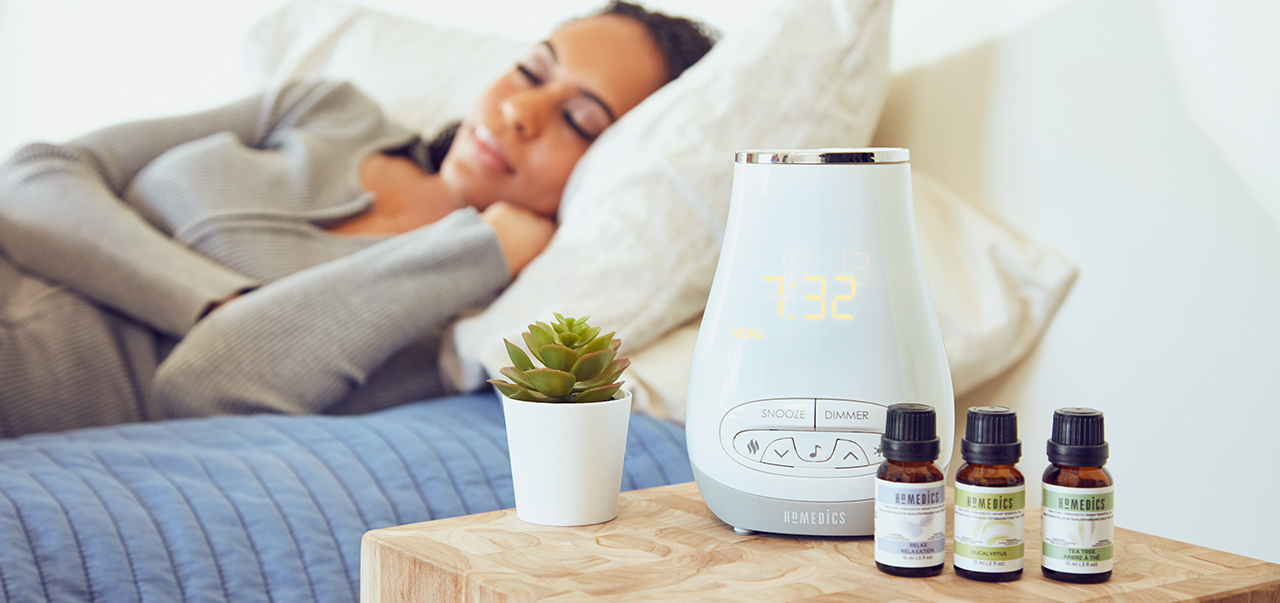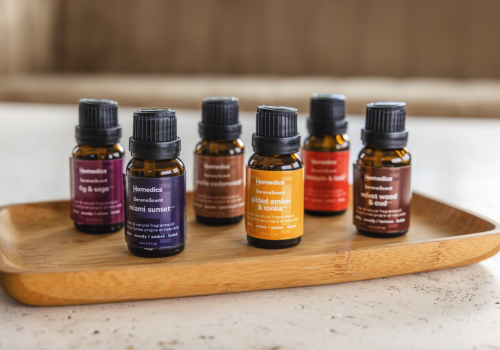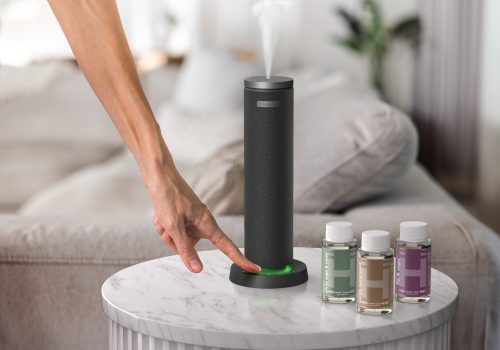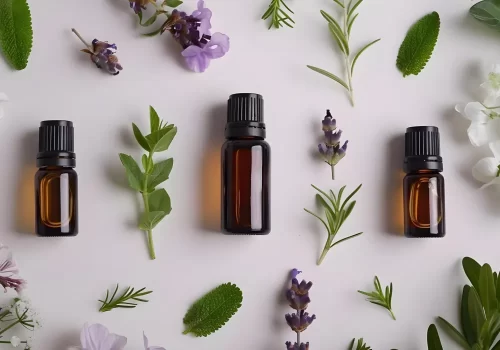What’s the Difference? Diffuser vs Humidifer
Humidifiers and diffusers both have positive effects on your home, but their specific benefits are distinct and important to understand. Which do you need for your home? That depends on what benefits you want from the air in your home.
It’s time to clear up the diffuser vs humidifier confusion. Explore the differences between these two categories of devices so you can decide which offers the most important benefits for your home.
HUMIDIFIER vs. DIFFUSER: CLEARING UP A COMMON MISCONCEPTION
Is a diffuser the same as a humidifier? Although both humidifiers and diffusers technically diffuse liquids into the air, they’re more different than they are similar.
The main difference between a humidifier and a diffuser is in their output: humidifiers simply emit water vapor into the air while diffusers emit essential oils contained in tiny water droplets. Humidifiers are designed to increase the moisture in the air while diffusers are meant to disseminate an aroma throughout a room.
Humidifier vs. Diffuser: Breaking Down the Details
Humidifiers typically pull water from a reservoir and spread it into the air to increase the relative humidity level. Several types of humidifiers exist that fall into two primary categories: cool mist humidifiers and warm mist humidifiers.
•Steam vaporizers boil water to disperse steam into the air.
•Evaporative humidifiers use a wicking filter to draw water out of the tank and emit a fine mist using fans.
•Ultrasonic humidifiers can come with two modes:
- Cool mist–Ultrasonic vibrations turn water into water vapor and disperse it into the air.
- Warm mist–A heating element preheats the water as it becomes droplets, emitting a warm mist.
Diffusers are typically smaller than humidifiers. There are different types of diffusers, which may use heat, fans, water, or another mechanism to diffuse the oil. These include the following:
•Water-based ultrasonic diffusers
•Reed diffusers
•Pad diffusers (heated or room temperature)
•Liquid wick (heated or room temperature)
•Hot oil/wax diffusers
•Essential oil diffusers
Many water-based diffusers look like humidifiers, but they perform a different function. Diffusers are aromatherapy devices. Water-based diffusers use ultrasonic vibrations to emit the oil’s therapeutic aroma into the air.
While humidifiers and diffusers both release vapor into the air, the former is designed to add a potentially significant amount of humidity to the air inside your home while a diffuser emits only a tiny amount of essential oil.
PROS OF USING A HUMIDIFIER
People spend most of their time indoors, so improving indoor air quality is an important component of staying healthy. Dry air can lead to a variety of discomforts and health issues, especially in dry climates or the winter, when the air is colder and holds less moisture. The ideal humidity level for most circumstances is between 30 percent and 50 percent.
Maintaining a healthy moisture level with a humidifier can deliver numerous benefits but also comes with a few minor drawbacks.
Pro: Humidifiers Reduce a Cause of Skin Dryness
Dry air sucks the moisture right out of your skin, leading to dry skin and irritation. Moisturizing lotion can help, but you’ll still be spending hours subjecting your skin to dry air every day.
Using a portable humidifier is the one of the best and most convenient ways to increase indoor humidity room by room. Increasing the amount of moisture in the air causes less moisture to evaporate from your skin, helping it stay hydrated. Both cool mist humidifiers and warm mist humidifiers can fend off the dry air that causes skin dryness and help you feel fresher and more comfortable throughout the day.
Pro: Humidifiers Reduce Triggers of Sinus Problems
Dry air can cause sore throats, sinus problems, and other minor breathing difficulties. It’s the culprit behind dry coughs, itchy nose, and scratchy throats.
Set up a humidifier in your bedroom to add moisture to the air. The increased humidity helps reduce the risk of throat irritation and nose itchiness caused by dry air. It can also contribute to more productive coughs, which dislodge mucus and help you breathe more comfortably.
Pro: Humidifiers Help Protect Hardwood Floors
As wood responds to the moisture in the air by shrinking and expanding, there’s a risk that it could warp over time. Keeping the humidity level steady through the drier, cooler seasons may help extend the lifespan/protect your hardwood floor from warping.
PROS OF USING A DIFFUSER
A diffuser is a great way to add refreshing, invigorating, or relaxing essential oils to your living space. Introducing specific essential oils into the air can have positive effects on your mental and physical well-being.
Diffusers use several technologies:
●Evaporative diffusers sometimes use small fans to blow air through a filter or pad onto which you place a few drops of oil. This slowly diffuses the oil into the air.
●Heated diffusers can disperse essential oils by warming the oil, causing it to evaporate.
●Ultrasonic diffusers use ultrasonic vibrations to create a fine mist from an essential oil, which is typically held in water. The essential oil particles are small enough that the mist can carry them into the air.
●Nebulizer diffusers use pressurized air to atomize the essential oils. This mist fills a glass tube and exits the diffuser, spreading throughout the room. A nebulizer emits 100 percent essential oil mist.
Pro: Diffusers activate aromatherapy benefits
People using essential oils for aromatherapy have reported soothing benefits. Diffusing essential oil’s aroma can stimulate specific feelings, influencing your mood and encouraging relaxation. You can make an aromatherapy diffuser part of your relaxation routine.
Pro: Diffusers are simple to operate
Like humidifiers, diffusers are easy to use and maintain.There are few moving parts, so they’re simple to clean.
To spread soothing and invigorating aromas throughout your home, simply place a few drops of your favorite essential oil scent on the filter pad or into the reservoir and turn the device on.
Pro: Diffusers can use many different scents
If you’ve never used an essential oil diffuser before, it can be tricky to choose a scent you like at first. But after trying a few types of oils, you’ll find the right aroma for you. Even better, you can keep exploring the wide variety of scents that are available to discover new favorites.
Essential Oil Diffuser Features
Some diffusers include LED lights which can be great as night-lights. But if you think the bright lights on a diffuser could interrupt your sleep, look for a model that lets you disable them. Most diffusers are nearly silent, but quiet operation is still an important feature to look for.
WHICH ONE IS RIGHT FOR ME—AROMATHERAPY DIFFUSER vs. HUMIDIFIER?
If you want to increase the humidity in your home to reduce the risk of irritation and sore throats, choose a humidifier. Increasing moisture in the air can also help you feel more comfortable, which promotes better sleep.
Look for a model with a water tank that’s large enough to last through the night. The humidifier’s runtime will help you estimate how often you’ll have to fill it. Also, make sure to choose a humidifier that runs quietly and has easily replaceable filters.
To make sure you’re choosing a humidifier that will work with the size of your room, measure the room’s square footage and compare it to each humidifier’s suggested room size.
If you want to use essential oils for aromatherapy, choose a diffuser. Look fora model that is compatible with your favorite essential oils and that uses your preferred diffusion technology. You can also compare the runtimes and recommended room sizes that each is designed for.
Diffusers come in many styles and designs. Many include LED lights that you can set to different colors or let cycle through patterns. You can choose a diffuser that matches your home’s décor and can act as a night-light, too.
DIFFUSER VS HUMIDIFIER: IT’S A WIN-WIN
With a better understanding of the difference between a humidifier and a diffuser, you can choose which one (or both!) will work best for your home environment. You can choose higher humidity, aromatherapy, or both to make your air quality at home as comfortable as possible!
Explore the different types of humidifiers and diffusers to find the model that best fits your lifestyle.
Medical Disclaimer: This content is provided for informational purposes only and not intended to be a substitute for professional medical advice, diagnosis or treatment.
SOURCES
How Dry Air Can Cause Respiratory Problems—From Bronchitis to Nosebleeds, Cleveland Clinic: https://health.clevelandclinic.org/can-best-combat-effects-dry-winter-air/
Warm-Mist Versus Cool-Mist Humidifier: Which Is Better for a Cold?, Mayo Clinic: https://www.mayoclinic.org/diseases-conditions/common-cold/expert-answers/cool-mist-humidifiers/faq-20058199
How Can You Tell If You Need a Humidifier, Cleveland Clinic: https://health.clevelandclinic.org/how-you-can-tell-if-you-need-a-humidifier/
Find the Right Size Humidifier for Any Room, Consumer Reports: https://www.consumerreports.org/humidifiers/right-size-humidifier-for-any-room/





